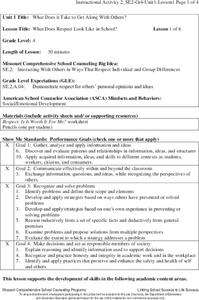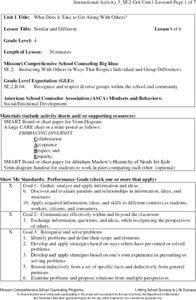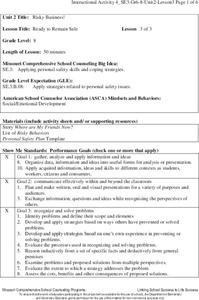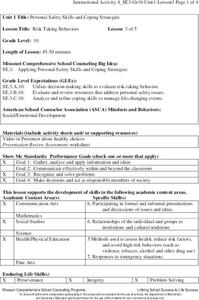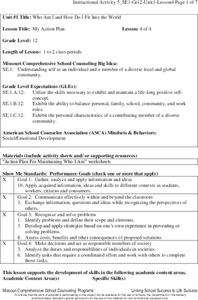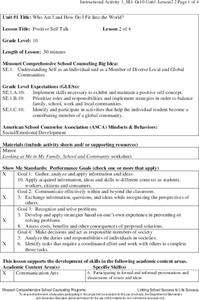Missouri Department of Elementary
The Problem Solving Game
Creativity, communication, cooperation. Pupils assume the role of employees at a game factory working together to develop a new game. Using the principles of the STAR method (Stop, Think, Act, Review), they work in teams to create game...
Missouri Department of Elementary
What Does Respect Look Like in School?
What does it mean to be respectful? Scholars complete a self-assessment worksheet to determine just how respectful they are. Next, they choose three items from the survey and write plans for how to improve in those areas.
Missouri Department of Elementary
What Does Respect Look Like at Home?
Individuals consider why is it important to respect family members as they complete a self-respect survey to assess their respectful behaviors at home. They then choose three items from the survey and write about how they plan to improve...
Missouri Department of Elementary
Similar and Different
Using a Venn diagram, pupils compare the similarities and differences between two classmates. Next, they review the CARE acronym (Collaboration, Acceptance, Respect, Empathy) and discuss how it applies to diversity in the classroom.
Missouri Department of Elementary
Celebrate Your Culture
After a class discussion about celebrations and customs, class members draw pictures depicting special events from their family cultures. Next, they draw pictures of an event from a different culture and share their work with classmates.
Teaching Tolerance
Why Do We (Still) Celebrate Columbus Day?
What are we really celebrating on Columbus Day? The resource explores the narrative behind Columbus Day and ways for people to change the perception. Scholars also review vocabulary terms associated with the topic and how attitudes have...
Missouri Department of Elementary
Opportunity Knocks, But It Costs, Too!
Sixth graders practice six steps to effective problem solving. Working with the school counselor, class members are presented with a scenario that requires them to make a decision. Individuals then write a reflection in which they...
Missouri Department of Elementary
Putting on Armor
Peers can exert tremendous pressure that can lead to positive and negative consequences. To conclude the Risky Business unit, class members create a Personal Safety Plan. They list things or situations that cause stress, things they have...
Missouri Department of Elementary
The Hope to Cope: Coping Skills
Making decisions can be stressful, even for sixth graders. And even students this young have developed coping skills, some positive and some negative, to help them deal with stress. Class members are asked to identify several of their...
Missouri Department of Elementary
Community Wellness Fair
Seniors work with teachers, counselors, and administrators to organize a community wellness fair. Committees take on the responsibility for the various tasks (publicity, set up, hospitality room, agency contact, thank you letters, etc.)....
Missouri Department of Elementary
A Stranger Among Us
The final lesson plan in the R.E.S.PE.C.T series asks eighth graders to expand their vision beyond the walls of the classroom and to consider how they can promote acceptance and respect of others within in the global community. "A...
Missouri Department of Elementary
I Know What You Did This Summer
Developing and maintaining healthy interpersonal relationships is difficult, especially as middle schoolers begin dating. A short activity permits eighth graders to practice their skills as they consider how they should respond to a...
Missouri Department of Elementary
Survivors
Developing a positive self-concept can sometimes be a challenge. Seventh graders engage in an activity that helps them identify their individual strengths and helps them recognize how these strengths can contribute to being a successful...
Missouri Department of Elementary
Risk Taking Behaviors
Sophomores can be sometimes wise and sometimes foolish. The same can be said for their behaviors. After watching a presentation about risk taking behaviors, class members discuss the presentation in small groups, and then complete a...
Missouri Department of Elementary
My Action Plan
To complete a study of the importance of developing a positive self-image, high school seniors complete an "Action Plan for Maintaining Who I Am" worksheet. They then submit their finished worksheets for inclusion in their Personal...
Missouri Department of Elementary
Assessing Self-Concept
A "My Self-Concept Report Card" worksheet launches a lesson about the importance of positive self-talk. After completing the worksheet, individuals make a list of the things they would do to improve or maintain a positive self-concept.
Missouri Department of Elementary
Positive Self Talk
Mirror, mirror. Hook sophomores into the benefits of positive self-talk with a lesson that asks them to reflect on the roles they play at home, at school, and in their communities. Class members fill out a “Looking At Me In My...
Teaching Tolerance
Participating in Digital Communities
It's possible to promote inclusion and empathy on the Internet—it just takes effort! Scholars read and discuss a short story about being a friend online. Then, pupils role-play appropriate ways to respond to hate within a digital...
Teaching Tolerance
Introducing 'The New Jim Crow'
When Jim Crow Laws ended, the intent behind them did not. Academics read "The New Jim Crow Laws" and an interview from the author to understand how racism has not ended, but rather changed over time. The lesson explains how prejudices in...
Teaching Tolerance
Jim Crow as a Form of Racialized Social Control
Just because slavery was illegal doesn't mean it went away ... Jim Crow Laws took its place. An eye-opening lesson plan focuses on how Jim Crow Laws were used as a form of racial social control against African Americans in the United...
Teaching Tolerance
Mass Incarceration as a Form of Racialized Social Control
Mass incarceration: A result of a tough stance on crime or racial discrimination, you decide. Academics explore the history and reasons behind mass incarcerations in the United States and its impact on ethnic communities. The...
Teaching Tolerance
The War on Drugs—Mechanisms and Effects
The war on drugs doesn't have definite results. An interesting lesson examines the social, political, and economic effect of the war on drugs. Academics learn how the war on drugs has led to mass incarcerations and negatively affected...
Teaching Tolerance
Racial Disparity in the Criminal Justice System
Explore the impact of the war on drugs in a thought-provoking lesson for high school academics. Young historians delve into the world of the criminal justice system and the racial disparity that occurs in the US. The resource provides...
Teaching Tolerance
Understanding the Prison Label
Break the chain. An engaging lesson examines why it is so hard to break free of the prison system in the US. Academics participate in a reader's theater, read primary sources, and discuss their thoughts. The lesson explains the hardships...
Other popular searches
- Equality Tolerance
- Teaching Tolerance
- Religious Tolerance
- Acceptance Tolerance
- Cultural Tolerance
- Racial Tolerance
- Tolerance and Diversity
- Tolerance Quiz
- Tolerance Lesson
- Poetry About Tolerance
- Racial Tolerance Activities
- Culture Community Tolerance



